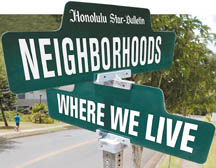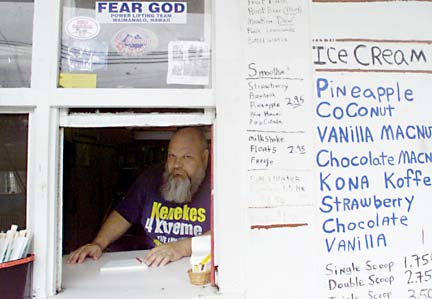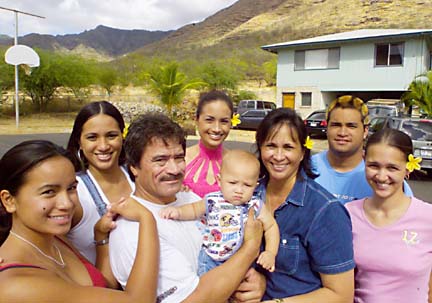
Separated by two mountain ranges and distinct rainfall patterns, the link between Waimanalo and Nanakuli is their vibrant Hawaiian communities where the homelands act of 1920 established two of the largest land bases on Oahu for the islands' first inhabitants. 'Nalo on the lush Windward side glows green from the foot of Koolau ridges to its brilliant spans of beaches while shades of buffs and browns polish the arid bowl of Nanakuli, tucked into the Waianae backbone.
Paved roads in Waimanalo still conform to the contours of the landscape, dipping to allow shallow drainages through the ahupuaa where agriculture clings tightly to a distant past. In Nanakuli, kiawe and grasses have given way to modest houses favored with plumeria and coconut trees, but its streets circle down toward an indigo sea.
Cultural and physical connections to land and ocean rest firmly in these neighborhoods of Hawaii's native people.
Waimanalo | Nanakuli
BACK TO TOP |
CINDY ELLEN RUSSELL / CRUSSELL@STARBULLETIN.COM
Keith Ward worked the window of Keneke's during the Labor Day weekend.
Waimanalo is working
and winning, not whiningThe district has 1,906 acres
of Hawaiian homestead land
There is nothing urban about Waimanalo, except for the clothing worn by some area youths. It is strictly country and residents like it that way.
'Nalo, as it's affectionately called, is home to 10,000 Hawaiians and Pacific Islanders, Asians, Caucasians and other ethnic groups. About half are of native Hawaiian or other Pacific Island descent, according to the 2000 census.
There are more than 1,906 acres of Hawaiian homestead lands in Waimanalo containing 644 homes and 3,028 people. The median household income was $60,357, with 14 percent of the homestead population receiving public assistance. The demographic information is contained in a draft Department of Hawaiian Home Lands report based on 2000 census data.
"The other thing is the kupuna housing project, Kauhale Kupuna O Waimanalo," said department director Micah Kane. The affordable-housing project for native Hawaiians over 62 is not fully occupied, though there is no blood quantum requirement.
That said, "Waimanalo is much more diverse than people think," said Kane. "There's a substantial agricultural community that people aren't aware of."
Dean Okimoto's trademarked Nalo Greens, popularized in salads at upscale restaurants, is available in supermarkets and are a high-profile example.
Nalo is God's country, people will say, but the distinction does not protect it.
Trouble started with the 1999 closure of Unisyn Biowaste Technology, if you ask Keneke's restaurant president and area resident Keith Ward. Then Waimanalo Dairy closed.
"So between those two facilities, we probably lost almost 50 employees, working consumers in the Waimanalo community," he said. Shuttered businesses don't need deliveries or pickups, so fewer drivers would stop in for lunch at businesses like Keneke's.
"Then we had Sept. 11, and -- boom! -- Sept. 11 just shut everything down," Ward said.
Visitor traffic slowed, and an Oct. 15 rockslide at Makapuu closed Kalanianaole Highway and nearly choked the town.
Keneke's lost close to 50 percent of its business. Half of the 12 employees were laid off. "We're back to about nine or 10 right now," but recent calculations show the business is at a five- or six-year low, he said.
Despite the losses, Ward maintains the other part of his business: his weightlifting ministry to Waimanalo area boys, many of them fatherless. Some want to bulk up for football, while others just want to look tough, Ward said.
"But I'm also humbling them. I take them to competitions and they walk out on stage ... they can be the baddest little punk in Kailua High School, but that isn't going to get that bar up there."
Gatherings four times a week include weightlifting, fellowship and prayer.
Sporadic road closures ended May 16 when the Makapuu hillside project was completed, but by then some businesses were shuttered.
Waimanalo Shopping Center lost Price Busters. Ward opened a second location named Ken's at the center, which also recently welcomed the Gina & Nam Barber Shop.
At least one business has expressed interest in part of the vacant space, according to Barbara Mueller, property manager for Watumull Properties Corp.
Waimanalo has plenty of community institutions, given its agrarian, beach-lifestyle and tourism-supporting roots. "There is a bakery known for their glazed doughnuts, Keneke's, Akebono's statue (outside Sumo Connection) and Mel's Market. It should be a historic site. Everybody knows Aunty Helen," Kane said.
BACK TO TOP |
GEORGE F. LEE / GLEE@STARBULLETIN.COM
The Ho'ohuli family of Nanakuli -- Roelle, left, Resha, Wayne, Radasha, Wynden, Hoku, Watson and his wife, Kristi -- pose in the cul-de-sac at the end of Pikaiolena Street in Nanakuli.
Everybody is well
known to everyoneMost families spend weekends at the
beach or talking story at a relative's house
The Ho'ohuli family has lived in Nanakuli for three generations, even before the first Hawaiian homelands were established. The family watched the tangle of kiawe trees in their back yards be replaced by neighbors in new houses and the two-lane highway widen to four lanes.
Even with new families moving into the neighborhood every year and more homestead communities added, the Ho'ohulis can tell you who lives where. "That's the DeFreitas, the Nuhuhas," said Radasha Ho'ohuli, pointing to the beachfront homes along Keaulana Avenue.
"Everyone knows everyone here and their business," said her mother, Hoku. "My kids remind me to make it quick when I go shopping at Sack 'n Save because I always run into someone and stop to talk about how the family is."
The Ho'ohulis spend the weekends like most families in Nanakuli: at the beach with family or at a relative's house to relax and talk story about old times.
That's probably why all the garages in Nanakuli have picnic tables inside instead of cars, said Hoku.
Hoku and her husband, Wayne, chose to stay in Nanakuli close to both their parents and many aunties and uncles. All of their children -- Radasha, 23, Resha, 22, Watson, 21, and Roelle, 18 -- went to elementary school in Nanakuli. Resha even went to Nanakuli High School instead of Kamehameha Schools like her sisters and brother because she liked Nanakuli. Hoku said she doesn't mind getting up at 4 a.m. to drive to work at Kamehameha or to Watson's UH football games on weekends.
"I love the climate, although it's hot. ... It's country," Hoku said. "I don't have to worry about apartments or fight parking. ... My neighbors help to keep an eye on my home."
When something is stolen, you know who took it within a matter of hours, Hoku said, laughing at how close the community is. "We call it the coconut wireless."
For Wayne, Nanakuli means ocean and family. Walking along the reef, he pointed to the small coves where he learned to surf, taught his children to swim in the underwater tunnels and where his family's ashes are scattered.
Watson learned to swim in the calm blue-green waters with his dad. Even though Watson and wife, Kristi, live in Makakilo, he will teach his 10-month-old son, Wynden, to surf and swim in the same water. He even told his wife they will move back so Wynden can wear gold and black one day -- Nanakuli's high school colors.
Wayne can't imagine his day without a ride on the waves or picking limu kohu and gathering cowrie shells.
"Best part is the beach," he said. "Not too many people know this place, and I wouldn't want to live anyplace else."





